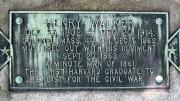Here’s a post-Valentine’s Day gift for us all: a revelation about Love Story. Both the novel by the late Erich Segal ’58, Ph.D. ’65, and the film based on it came out in 1970, and so it’s past time we got to the bottom of every jot and tittle of the thing. (The film remains staple fare in Harvard precincts and is shown every year during freshman-orientation week to set newcomers on the right path. The last line, “Love means never having to say you’re sorry,” always draws groans and cheers.) The drama features Oliver Barrett IV, Harvard undergraduate, hockey player, and patrician, and Jennifer Cavilleri, a quick-witted working-class Radcliffe College student. They fall in love and later marry—against the wishes of Oliver’s father, who cuts off funding—and Jenny dies of an incurable disease. Early on, Oliver takes Jenny to meet his parents, who live in Dover House, in bucolic luxury north of Boston. Oliver recounts their approach:
“I drove slowly once we were on Barrett soil. It’s at least a half mile in from Groton Street to Dover House proper. En route you pass other...well, buildings. I guess it’s fairly impressive when you see it for the first time.
“‘Holy [expletive],’ Jenny said.
“‘What’s the matter, Jen?
“‘Pull over, Oliver. No kidding. Stop the car.’
I stopped the car. She was clutching.
“‘Hey, I didn’t think it would be like this.’
“‘Like what?’
“‘Like this rich. I mean, I bet you have serfs living here.’”
The meeting wasn’t fun. Now for the revelation. John Winthrop ’58, who lives in Charleston, South Carolina, and describes himself in his fiftieth-reunion report as “timber farmer, trustee, money manager, bon vivant,” had a letter from his friend and classmate Segal in which the author testified: “I’ll freely admit to you now that much of the terrain in Love Story is Winthrop property. It never occurred to me that you might be related to the inhabitants of Groton House [an actual, vast, horsey place in Hamilton, Massachusetts, sometimes open to the public but long lived in by Winthrops], which of course is ‘Dover House,’ home of the mythical Barretts….I hope the Winthrops don’t mind my appropriating their land—in fiction—and I assume there was nothing in my tale to offend. In fact, I hope they’re a bit flattered!”
Panting to serve: This spring is the sesquicentennial of the end of the Civil War. Carol LaFleur, of Quincy, Massachusetts, took the occasion to send Primus photographs of the grave of Henry Walker, class of 1855, who is buried in the Mount Wollaston Cemetery across the street from where she and her husband live. She retired last June after 46 years spent working at the School of Public Health, most recently as administrative assistant to the dean of students, and so she naturally took note of a plaque on Walker’s tombstone that identifies him as the first Harvard alumnus to enlist to fight in the war. Of the 1,662 men with Harvard ties who fought on one side or the other, 246 died; overall, at least 620,000 soldiers and sailors died in combat or from war-related diseases. Of course, no one knew at its start that the war would turn out to be a maximally bloody and otherwise horrible conflict. Historian and Harvard president Drew Faust has called it “a military adventure undertaken as an occasion for heroics and glory….” Indeed, his friends said that when Walker went to the Massachusetts State House to enlist, he arrived out of breath from running.
Doubter: From the second class report of the class of 1920, put together by class secretary Fifield Workum and issued in 1925, the entry of Lawrence Bluford Merchant: “Two love affairs. First girl married last year and second will marry next week, but not me. Future indefinite. Can’t make money without work and don’t like work. Beginning to doubt value of college. Have to work as hard as anyone. Thought college grads could live on knowledge.”









